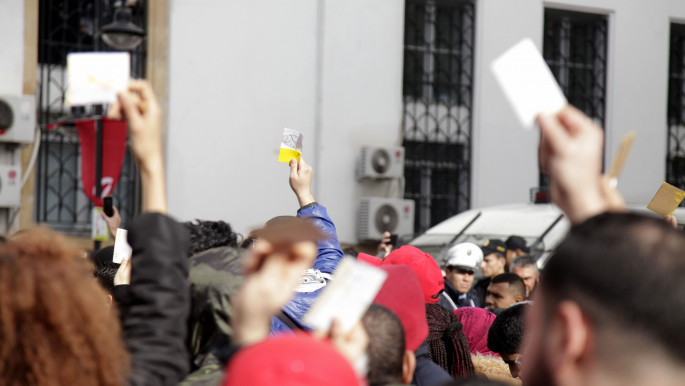Tunisians refuse to back down as protesters demand government reverse austerity measures
More than 200 young people rallied in Tunis following a call from the Fech Nestannew (What Are We Waiting For?) campaign for a major protest against the measures imposed at the start of the year. They held up yellow cards, chanted slogans and scuffled with riot police as they marched on administrative offices in the capital.
"We won’t back off till we have our claims fulfilled,” shouted Nacer, one the protesters, as his fellow activists called for renewed rallies over the weekend.
Warda, 22, a student and member of the newly created movement said she cannot understand how her parents can continue taking care of the family with these applied measures.
"I don’t understand how they want us to live with such austerity measures that are killing all our chances of having a decent life,” she added.
 |
|
| Protesters held up yellow cards during demos [Massinissa Benlakehal] |
A nationwide march has been announced for Sunday, as the country plans to celebrate the seventh anniversary of its 2011 revolution that toppled authoritarian president Zine al-Abidine Ben Ali.
Since Monday, violent protests have flared across the country. Police used force and fired tear gas at protesters while clashes were also reported in many cities of the country during the week.
One man died in the unrest on Monday night, but the authorities have insisted the police were not responsible for this.
"Tunisian security forces must refrain from using excessive force and end their use of intimidation tactics against peaceful demonstrations,” Amnesty International said in a statement on Friday.
Tunisian authorities said on Friday the number of people detained in the wave of violent protests had risen to nearly 800, after a provincial town was hit by a night of unrest over the austerity measures.
In a statement to the press on Friday, Navi Pillay, the United Nations High Commissioner for Human Rights called on the government to stop using “excessive force.”
“Human rights defenders and bloggers, arrested solely for their peaceful activities, must be released immediately,” Pillay added.
The government has blamed the opposition bloc and protesters accusing them of causing unrest and violence.
The opposition bloc, mainly the Popular Front, denied such accusations, pointing out that the current government is "reproducing the old regime’s methods."
Austerity measures, according to economical experts were introduced to respond to the requirements of the country’s financial partners. This huge deficit is due to the important decrease of touristic incomes and foreign investments in the past years, the government claims.
Tunisia is considered a rare success story of the Arab Spring uprisings that began in the North African country in 2011 and spread across the region, toppling autocrats.
But the authorities have failed to resolve the issues of poverty and unemployment.

![Palestinians mourned the victims of an Israeli strike on Deir al-Balah [Getty]](/sites/default/files/styles/image_684x385/public/2024-11/GettyImages-2182362043.jpg?h=199d8c1f&itok=xSHZFbmc)


![The law could be enforced against teachers without prior notice [Getty]](/sites/default/files/styles/image_684x385/public/2178740715.jpeg?h=a5f2f23a&itok=hnqrCS4x)
 Follow the Middle East's top stories in English at The New Arab on Google News
Follow the Middle East's top stories in English at The New Arab on Google News

![Voters in Michigan [Getty]](/sites/default/files/styles/image_330x185/public/2182490468.jpeg?h=a5f2f23a&itok=XMi_sWGX)
